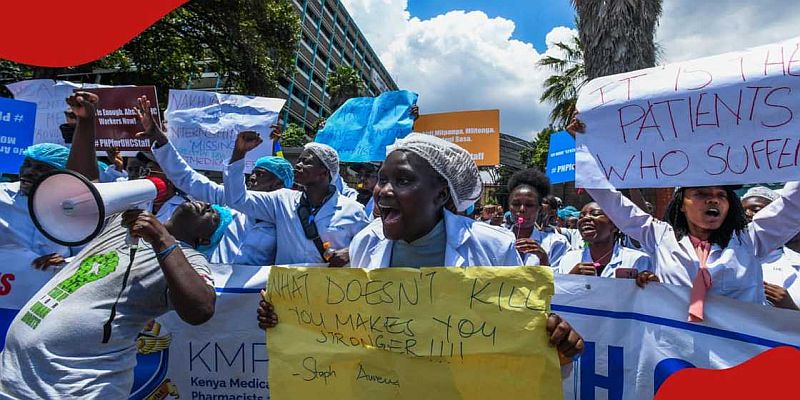Kenya's Fading Pillars: A Crisis of Health and Education

The recent viral video of a distraught father carrying his lifeless child through hospital corridors, his cries of neglect echoing a nation's despair, is not an isolated incident. It is a raw, heartbreaking symptom of a deeper malaise gripping Kenya: the systemic failure of our health and education sectors. These are not merely administrative shortcomings; they represent a profound erosion of humanity and a betrayal of the social contract.
Kenya's healthcare sector is teetering on the brink as escalating strikes involving doctors and nurses disrupt essential medical services, leaving thousands of patients without critical care. The medical practitioners cite numerous grievances ranging from erratic transfers, persistent salary delays, and excessive workloads. A 2023 study placed Kenya’s doctor-to-patient ratio as 19 practitioners per 100,000 people, which translated to 1 doctor per 5,263 Kenyans, five times the WHO-recommended ratio of 1 doctor for every 1,000 people. Around 4,000 doctors and nurses leave Kenya every year. In 2023, 64.4% of health professionals expressed a desire to leave the country for greener pastures abroad.
According to a 2024 Afrobarometer survey, majority of Kenyans lack medical aid coverage, citing high costs. Six in 10 Kenyans (61%) said they did not have any medical aid coverage. Only 39% said that they were covered by some form of medical aid.
A majority of Kenyans are at the mercy of a system that appears increasingly indifferent to their suffering. The image of a doctor forced to sell peas by the roadside is a stark indictment of unemployment and underappreciating within the medical fraternity, painting a grim picture.
In contrast, others are accused of charging exorbitant fees for basic assessments, like the Sh15,000 for a ten-minute dementia evaluation. The tragic account of a friend's brother, who languished in a hospital without a diagnosis until death claimed him, underscores the devastating consequences of these systemic failures. And let us not forget the disturbing revelations of medicines being stolen from hospitals, a clear sign of corruption that directly jeopardizes patient lives.
The crisis extends beyond the hospital walls. Our education system, the supposed bedrock of future generations, is in disarray. The "Competency-Based Curriculum" (CBC), despite being lauded by its proponents at KICD, remains inscrutable mainly to the very people it is meant to serve. Parents, teachers, and even some administrators struggle to understand its pathways, the availability of necessary books, and the creation of appropriate learning environments. The paradox of unemployed teachers alongside a struggling curriculum speaks volumes about misplaced priorities and a lack of coherent planning.
This bleak reality is further exacerbated by the glaring disconnect between the needs of the populace and the actions of our leaders. We observe them generously donating to churches, while hospitals lack basic facilities, even something as fundamental as toilets in maternity wards. They traverse the country in helicopters, a stark contrast to underpaid doctors and unfurnished hospitals. The casual indifference displayed at funerals, transformed into political battlegrounds where rival groups curse each other and leaders engage in "fun days" rather than genuine mourning, reveals a shocking disregard for human life. Deaths are no longer perceived as natural occurrences but rather as the tragic outcomes of a profound irresponsibility on the part of those in power.
The consequences are starkly evident in the widening chasm between the privileged and the vast majority. Those with financial means can access international education curricula and seek treatment abroad, effectively opting out of the failing domestic systems. This creates a two-tiered society, where quality health and education become luxuries rather than fundamental rights.
What has happened to the value of humanity? It seems that a pervasive obsession with money and fame has overshadowed the core tenets of public service among both leaders and professionals. This has created a crisis of faith in our institutions.
Restoring that faith will require more than mere rhetoric. It demands a radical shift in priorities, a re-evaluation of values, and a commitment to genuine accountability. We need leaders who understand that their primary responsibility is to serve the people, not to enrich themselves or engage in political theatrics. We need professionals who are empowered and incentivized to prioritize patient care and quality education over personal gain.
The images of a grieving father, a struggling doctor, and a confused populace are not just viral videos; they are a desperate plea for a return to fundamental human decency and a functioning society. The time for empty promises and political posturing is over. Kenya's health and education systems are on life support, and only a concerted, ethical, and compassionate effort can revive them.
By Dr Mary Njeri Kinyanjui
Founder Director, Beyond Knowledge Horizons.
